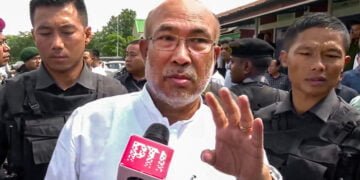The Congress Party formally quit the ruling Khasi Hills Democratic Forum (KHDF) coalition that is in power in the Khasi Hills Autonomous District Council (KHADC) today.
Congress MDCs announced their withdrawal in a letter to the KHADC Chief Executive Member Pyniaid Sing Syiem.
The alliance thus brought an end to the experiment of the Congress collaborating with the National People’s Party (NPP) in a governing situation.
Following this decision, Pynshngainlang N Syiem, leader of the Congress Parliamentary Party in the KHADC, resigned as Deputy CEM. Ronnie V Lyngdoh also stepped down as Chairman of the Advisory Committee in the KHADC. Jirang MDC Victor Rani who joined the Congress after leaving the NPP on Wednesday, also resigned as executive member.
Explaining the decision, Syiem stated that the Congress had no option but to withdraw from the KHDF. He cited growing difficulties in collaborating with the NPP within the council, reflecting the concerns of party leaders and workers. “Since September 20, party leaders have been urging immediate withdrawal from the NPP-led EC,” Syiem said. Presidents of district Congress committees (DCCs) even sought intervention from the All India Congress Committee (AICC) over the delay in the withdrawal process.
With KHADC polls just around the corner, party workers are worried that working with the NPP will cost its support from the public.
Addressing the delay, Syiem explained, “From the beginning, our partnership with the NPP in the KHADC was aimed at addressing critical issues such as amending the Sixth Schedule and empowering traditional institutions. While progress was being made, it was important to avoid hasty decisions that might hinder our shared goals.”
He commended the achievements of the KHDF-led EC, noting its contributions to traditional institutions, women and youth organisations and the traditional clan system. Regarding the proposed amendment to the Sixth Schedule of the Constitution, Syiem highlighted discussions with the Union Ministry of Home Affairs on suggestions for safeguarding the district council’s autonomy. “We recommended that the Governor should appoint nominated MDCs only based on the council’s advice, ensuring the council’s authority and protecting indigenous rights,” he explained. He also opposed the inclusion of unrepresented tribes and suggested limiting nominated MDCs to two, including one woman.
On financial matters, Syiem stressed the importance of adhering to district council recommendations and advocated for granting Governors, not the President, the power to exempt central laws like the controversial Citizenship Amendment Act (CAA).
Despite the withdrawal, Syiem expressed confidence in Congress’s prospects in the upcoming KHADC elections. “The outcome will depend on the performance of our leaders. If we’ve accomplished so much in a short time, the people will expect even more, and we will deliver,” he said. Congress, he confirmed, will take on the role of a constructive opposition. “We will hold the EC accountable and oppose constructively if necessary,” he added.
Despite the pull out of the Congress, the KHDF will likely remain in power as it still commands a majority, albeit reduced, in the house.























